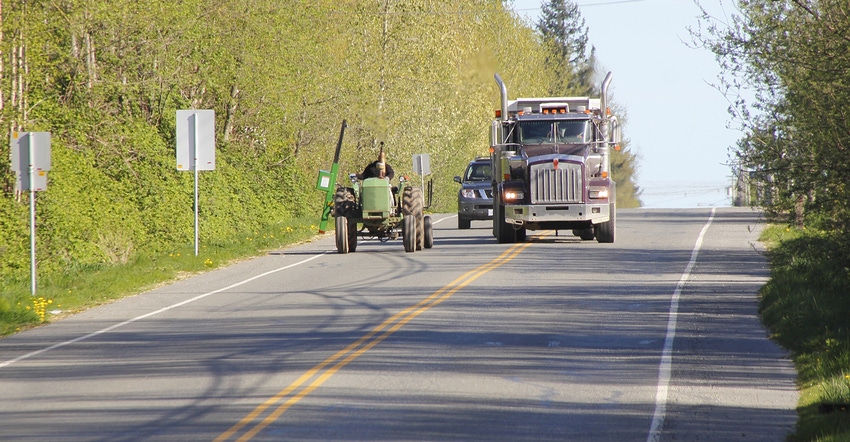April 16, 2021

Perhaps it’s because I work in the farm industry. Maybe it’s because I’m getting older. But when I drive down my rural roads, the need for speed is no longer in me. Fellow driver, I’m the one following the tractor with my flashers on, so slow down.
In my area of the state, there are curves, hills, narrow roads and no shoulder. Farmers trying to get crops in the ground or livestock moved must be nimble drivers just to stay on the road and out of the ravine. But complicating the issue is the other drivers on the road — those with a little less understanding of the maximum speed in which a tractor can travel.
So, when I pull off of my country road onto a state highway right after a blind hill and see my neighbor on a tractor, I put on my flashers and drive behind him. I stay back offering room, but I'm always looking in my rearview mirror. My thought: If someone flies over that hill, they must get through me before they get my farmer. And most times it works. My fellow driver slows down in time.
My worry is when there is no one behind the tractor and distracted drivers come up too fast. It is a danger to them and our farmers.
So, whether you live in a rural community or in town, now is the time to slow down in the country. Give space to those who produce your food, fiber and fuel. Allow them to get to their “job” safely, without stress or unnecessary road rage.
Simply back off, drive slowly and enjoy the view. Then when the time is right, slowly drive by and give your farmer a wave or a nod of thanks.
Farmers do their part
Karen Funkenbusch, University of Missouri Extension safety and health specialist, says farmers should review basic road safety as well.
Remind others to share the road, slow down and watch rural roads for slow-moving farm equipment on hills and curves, she says. Farmers also should check equipment for slow-moving vehicle (SMV) emblems and do a safety check of turn signals and mirrors before driving.
Do everything to reduce other distractions. Then be alert and watch for other drivers on the road.
Other safety concerns
Funkenbusch says spring is the time to talk about not only sharing the road, but also farm safety. She offers these four areas to review and resources to help:
1. Kids and tractors don’t mix. Discourage children from riding on tractors. They can fall off or become injured in power takeoff accidents. If there are children on the farm, make a habit of walking around equipment before starting the tractor, Funkenbusch says. Avoid loose-fitting clothing, and tie back long hair to avoid PTO tragedies. See Show-Me Farm Safety for more guidelines at farmsafety.mo.gov.
2. Monitor ATV riders. Many farm families own and operate all-terrain vehicles for work and fun, but ATVs are powerful and potentially dangerous vehicles. Funkenbusch says families should review rules and adhere to age and legal requirements. Follow recommendations on weight limits, number of riders and safety equipment such as helmets, eye protection and clothing. Find more information at atvsafety.gov.
3. Educate about chemical use. Train family members and workers to use proper personal protective equipment when working around herbicides, pesticides and fertilizers. Thoroughly read, understand and follow label instructions, Funkenbusch says. Store chemicals in original containers, and keep children away from them. Know the telephone number of your local poison control center or keep the National Poison Control Center number, 800-222-1222, posted.
4. Stress less, sleep more. Funkenbusch finds that many accidents result from stress or lack of sleep. Equipment breakdowns, untimely rains and long hours can cause short-term stress that can reduce reaction times and prompt people to take shortcuts that lead to accidents, she says. According to the Centers for Disease Control and Prevention, adults need seven to nine hours of quality sleep daily.
MU Extension offers mental health resources through Iowa Concern, a 24-hour hotline that provides access to free stress counseling and other resources. Call 800-447-1985 or visit extension.iastate.edu/iowaconcern.
Funkenbusch also recommends Missouri 211 (dial 2-1-1), a referral and informational hotline, and Missouri’s Access Crisis Intervention hotlines. Find the ACI hotline for your county at dmh.mo.gov.
You May Also Like




